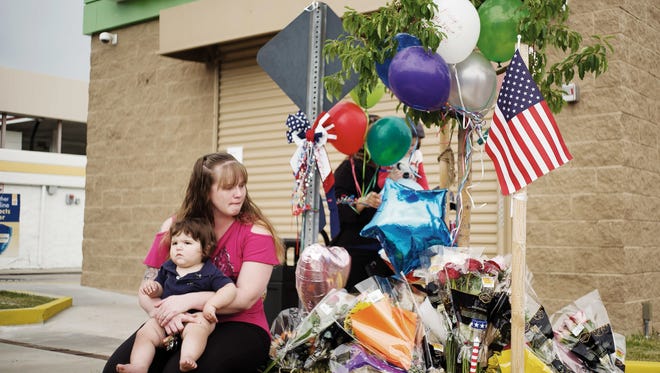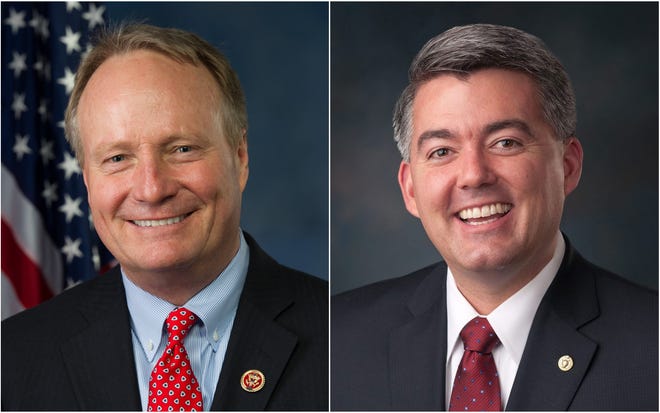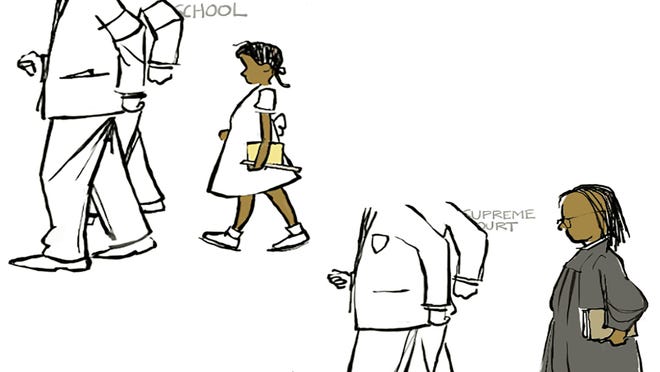Rep. Dave Joyce and former Sen. Cory Gardner
Travis Mason, a former Marine working as a hashish dispensary safety guard, dreamed about turning into a police officer. That dream by no means got here true. In 2016, Travis was shot and killed throughout a theft at work.
Tragically, crimes just like the one which took Travis’ life aren’t uncommon. Why? As a result of the federal authorities cannot get out of its personal manner.
Beneath federal regulation, establishments offering monetary providers to reputable, state-legal hashish companies are subject to criminal prosecution. Bank card corporations received’t course of transactions from dispensaries, and most banks received’t give loans or enable state-legal hashish companies to open accounts. This forces small companies to function in all money, making them and their workers sitting geese for violent robberies.
That’s why Rep. Ed Perlmutter, a Democrat from Colorado, launched the SAFE Banking Act. This bipartisan invoice would remove public security hazards, grant state-legal companies entry to the banking system, and permit the IRS to extra successfully acquire its honest and substantial share of taxes.

Up to now, the Home of Representatives has handed SAFE Banking six times, largely on a bipartisan foundation. The latest standalone version handed with 106 Republicans voting in assist.
Thoughts-boggling:Crime lab turned rape victim’s DNA into potential evidence for unrelated investigations
But, the Senate won’t act. By refusing to take up incremental reform payments like SAFE Banking, congressional management is perpetuating federal hashish prohibition and permitting the unsustainable patchwork of federal and state hashish legal guidelines to fester.
This lack of parity not solely threatens public security and trade entry – most frequently for minorities and small companies – it additionally prevents analysis and burdens the creation of federal income.
We have fallen behind the instances
Whereas America stays trapped in antiquated hashish insurance policies, different nations – together with the United Kingdom, Canada, South Korea, Germany and Israel have modified their legal guidelines to permit for various levels of legality and medical analysis.
Biden’s low approval score:Why is Biden now less popular than Trump? He’s earned it.
In america, hashish stays a Schedule I drug, which means it’s federally prohibited for medical functions and extra extremely regulated than synthetic opioids like fentanyl, which killed more than 55,000 Americans in 2020 alone.
But, in true bureaucratic hypocrisy, the federal authorities has held a patent on medicinal cannabis since 2003.
For those who’re amongst the dwindling 32% of Americans who don’t approve of federal cannabis reforms, you would possibly assume its prohibition hinders its general manufacturing, retains it off the streets and prevents it from falling into the arms of kids. However you’d be unsuitable.
We give police their energy:We have a moral duty to hold them accountable
Continued federal prohibition incentivizes unlawful and unsafe manufacturing, simply as alcohol prohibition did 100 years in the past. Unlawful develop operations often out-compete legal producers, who work inside expensive state laws with out the advantages of ordinary enterprise deductions and entry to capital to ship protected and dependable items to of-age people.
Fortunately, legalizing hashish is now not the divisive subject it as soon as was.
An awesome 91% of Americans support either medical or recreational cannabis legalization, and 47 states have legalized hashish to a point.
How we must always transfer ahead
So, the place do federal lawmakers go from right here?
The federal authorities must respect the desire of states which have enacted various types of legality and put together for an inevitable finish to prohibition. As Supreme Court docket Justice Clarence Thomas famous, “The federal authorities’s present method is a half-in, half-out regime that concurrently tolerates and forbids native use of marijuana.”
The federal government should additionally acknowledge that federal regulators, just like the alcohol trade, have an necessary function to play in making certain protected manufacturing and consumption. They should have the chance to weigh in on what a federal framework ought to appear like.
Concurrently, Congress ought to assist states and localities treatment the disproportionate penalties of hashish criminalization. Greater than 14 million People undergo from cannabis-related arrest data that occurred over the past 20 years. But at the moment, People in 18 states have legal access to recreational cannabis.
Penalizing People for minor offenses which can be no longer illegal in most states doesn’t put the metaphorical genie again in its bottle. It forecloses a lifetime of employment and housing alternatives and will increase recidivism charges.
Moreover, whereas lawmakers debate numerous regulatory and decriminalization proposals, President JoBiden ought to instantly “down schedule” hashish through his government authority. This may enable long-forbidden research to tell our nation’s cutting-edge scientists on all the pieces from multiple sclerosis and epilepsy therapies to freeway impairment requirements.
The straightforward fact is that continued federal hashish prohibition is neither tenable nor the desire of the American citizens. It’s time for Congress to behave on achievable, incremental hashish reform that may construct the bipartisan consensus essential to turn into regulation and enhance tens of millions of lives.

Rep. Dave Joyce, a Republican, represents Ohio’s 14th Congressional District. A co-chair of the Hashish Caucus, Joyce has led the bipartisan effort to enact federal hashish reform and authored landmark laws to that impact, together with the STATES Act, the Widespread Sense Hashish Reform Act and the HOPE Act.
Former Sen. Cory Gardner, a Republican, served Colorado within the U.S. Senate from 2015 to 2021, the place he championed laws to extend entry to banking for the hashish trade in addition to the STATES Act to codify federal protections for states that select to legalize marijuana. He’s presently a senior adviser for the Nationwide Hashish Roundtable.

















